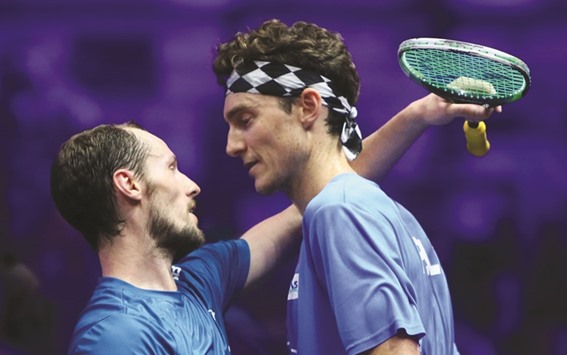Cameron Pilley, a 33-year-old Australian, who has never been ranked in the world’s top 10, made himself one of the sport’s most surprising success stories even before contesting Saturday’s final of the PSA World Series finals.
Previously best known for striking the ball at a world record 175 miles an hour, and with a relatively modest 13 tour titles, the ultra-tall Pilley added to his startling appearance in the tour’s flagship event showdown by the manner in which he reached it.
It involved a semi-final win over Mohamed Elshorbagy, the runaway world number one from Egypt, after getting past two other top-10 players during the group stages, and managing it all by not really thinking about it.
“In the past I have made mistakes by focussing too much on the outcome of matches, on the end result rather than how to get there. So I make a conscious effort not to think about the goals at all,” he explained matter-of-factly. “So think about what I can control. That’s my game and how to get better.”
Pilley will know that his wins have been achieved with shortened scoring—the best of three games and not five—and that Elshorbagy was impatient and inconsistent after playing more matches this year than any other leading player.
Nevertheless he is rightly pleased that he has been superbly accurate, particularly with wall-clinging drives during the sparring which goes on down the backhand side, and that has taken his chances calmly and well.
“I feel like I have been playing the best of my career,” he acknowledged. “Physically I am feeling really good. Mentally I am still keen. I made a couple of changes last year, a couple of technical things, and freshened up my training methods, and that gave me a wake-up call too, because I had been having average results. Since then I have been pleased with my form.”
It has been good enough to accumulate just enough World Series points to squeeze into last place among the eight qualifiers while remaining still outside the top 10 in the world rankings. Few expected him then to go on to qualify from his group.
It is reasonable to suggest therefore that by reaching Saturday’s final Pilley has caused the biggest surprise since another Australian, Paul Price, and a Welshman, David Evans, neither top level players, contested a British Open final more than a decade and a half ago, in the year 2000.
“Feeling pleased is an understatement, considering I just scraped in to get here,” Pilley admitted, before suggesting that losing in the group stages to Gregory Gaultier, the world champion from France—his opponent again in the final—had actually been helpful.
“I was thumped by Greg and I think that did me good, because since then I have been seeing the ball well I think that sharpened me up and gave me a wake up call,” he said.
“I had been on a high after beating (Omar) Mosaad (the World Open runner-up from Egypt), and that brought me back down. I made a conscious effort to cut out the unforced errors, and I did it well. I’ve been feeling really good on that court. It’s nice to play on. My length has been tight and I have hit the back corners.”
All this has enabled Pilley to contemplate the task of trying to emulate the last Australian to win the World Series finals, Anthony Ricketts 10 years ago in London. “I watched Ricketts win and it was amazing,” he said.
So did he dream of achieving the same thing? “Er, well no,” Pilley admitted with a half-grin. “Because you have to get into the top eight even to play in it, and I had never done that. So I actually never dreamed about doing well in this tournament at all.”

WELL PLAYED MATE: Gregory Gaultier (left) of France hugs Cameron Pilley of Australia after beating him in the title clash of the PSA World Series Finals squash tournament in Dubai on Saturday. The Frenchman won 11-4, 11-5, 8-11, 11-6. (AFP)
